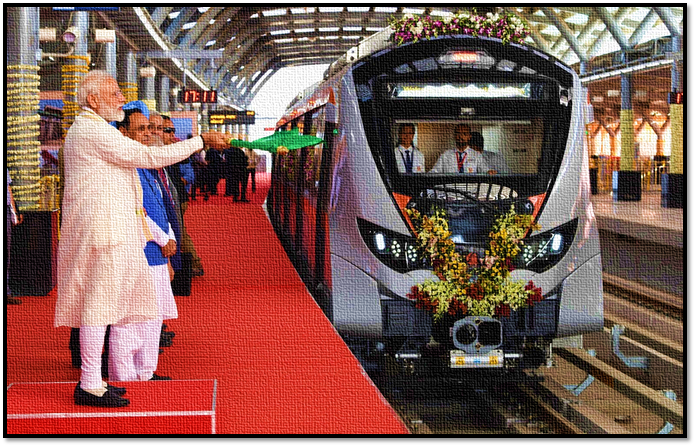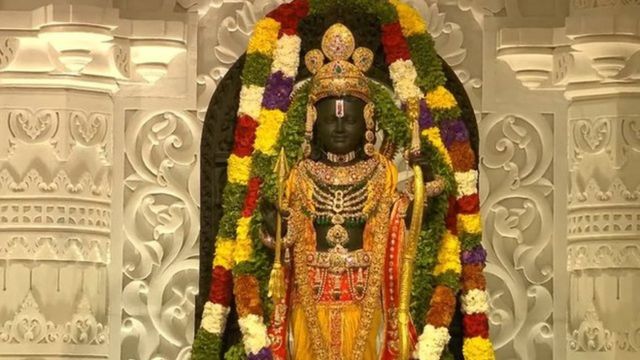India has achieved a significant milestone in urban transportation, with its metro network crossing 1,000 kilometers across 23 cities in 11 states. This achievement positions India as home to the third-largest metro network globally, transforming urban mobility and enhancing the ease of living for millions.
 Prime Minister Narendra Modi, on January 5, inaugurated and laid the foundation for metro projects worth over ₹12,200 crore. These projects include:
Prime Minister Narendra Modi, on January 5, inaugurated and laid the foundation for metro projects worth over ₹12,200 crore. These projects include:
Delhi-Ghaziabad-Meerut Namo Bharat Corridor: Inauguration of a 13-kilometer stretch to ease travel between Delhi and Meerut.
Delhi Metro Phase-IV: Launch of a 2.8-kilometer stretch benefiting West Delhi.
Rithala-Kundli Corridor: Foundation stone laid for a 26.5-kilometer section connecting Delhi and Haryana.
These advancements further strengthen the metro network, which serves over 1 crore passengers daily and recently surpassed Japan in operational metro length. India is now poised to overtake China as the second-largest metro network globally.
Key Milestones in India’s Metro Journey
India’s metro story began in 1969 with the Metropolitan Transport Project, but it wasn’t until 1984 that the first metro line opened in Kolkata. Since then, the journey has been marked by several significant milestones:
1984: India’s first metro line (3.4 km) inaugurated between Esplanade and Bhowanipur, Kolkata.
1995: Establishment of the Delhi Metro Rail Corporation (DMRC) to develop world-class urban transport.
2002: DMRC opened its first line between Shahdara and Tis Hazari, kickstarting metro expansion in Delhi.
2011: Bengaluru’s Namma Metro launched its first segment, expanding connectivity in South India.
2017: Chennai inaugurated its first underground metro stretch, marking a milestone for Southern India.
2020: Completion of Kochi Metro’s Phase 1, integrating Kerala into India’s growing metro network.
Innovations in Urban Mobility
India’s metro systems are not just about expansion but also innovation:
Underwater Metro: In 2024, Kolkata inaugurated its under-river metro tunnel, connecting Esplanade to Howrah Maidan under the Hooghly River.
Driverless Metro: In 2020, Delhi Metro’s Magenta Line introduced India’s first driverless metro service, advancing automation in urban transport.
Kochi Water Metro: Launched in 2021, this hybrid electric boat service connects 10 islands around Kochi, offering sustainable and efficient water-based transport.
Upcoming Metro Projects
Three major metro rail expansions are underway:
1. Bengaluru Metro: A 44-kilometer network comprising two new corridors.
2. Thane Metro: A 29-kilometer network aimed at reducing road congestion.
3. Pune Metro: A 5.5-kilometer route to improve urban mobility further.
Global Reach of Indian Expertise
India’s metro expertise has gained international recognition. The Delhi Metro Rail Corporation (DMRC) is managing metro systems in Bangladesh and providing consultancy services in Jakarta. Countries like Israel, Saudi Arabia, Kenya, and El Salvador are also exploring collaborations with DMRC for their metro development projects.
Prime Minister Modi emphasized the transformative impact of metro systems on urban mobility, stating, “Over the last decade, extensive work has been done to strengthen metro connectivity, enhancing the ease of living for millions.”
With its rapidly expanding network and cutting-edge innovations, India is redefining urban transportation and setting new benchmarks for sustainable and inclusive development. The future promises a seamless, efficient, and globally recognized metro network that will continue to elevate India’s urban landscape.




